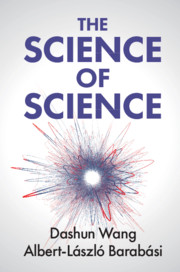Book contents
- The Science of Science
- The Science of Science
- Copyright page
- Dedication
- Contents
- Acknowledgements
- Introduction
- Part I The Science of Career
- Part II The Science of Collaboration
- Part III The Science of Impact
- Part IV Outlook
- 21 Can Science Be Accelerated?
- 22 Artificial Intelligence
- 23 Bias and Causality in Science
- Last Thought: All the Science of Science
- Book part
- References
- Index
22 - Artificial Intelligence
from Part IV - Outlook
Published online by Cambridge University Press: 07 February 2021
- The Science of Science
- The Science of Science
- Copyright page
- Dedication
- Contents
- Acknowledgements
- Introduction
- Part I The Science of Career
- Part II The Science of Collaboration
- Part III The Science of Impact
- Part IV Outlook
- 21 Can Science Be Accelerated?
- 22 Artificial Intelligence
- 23 Bias and Causality in Science
- Last Thought: All the Science of Science
- Book part
- References
- Index
Summary
Here we discuss how the use of artificial intelligence will change the way science is done. Deep learning algorithms can now surpass the performance of human experts, a fact that has major implications for the future of our discipline. Successful uses of AI technology all possess two ingredients for deep learning: copious training data and a clear way to classify it. When these two conditions are met, researchers working in tandem with AI technologies can organize information and solve scientific problems with impressive efficiency. The future of science will increasingly rely on human–machine partnerships, where people and computers work together, revolutionizing the scientific process. We provide an example of what this may look like. Hoping to remedy a present-day challenge in science known as the “reproducibility crisis,” researchers used deep learning to uncover patterns in papers that signal strong and weak scientific findings. By combining the insights of machines and humans, the new AI model acheives the highest predictive accuracy.
Keywords
Information
- Type
- Chapter
- Information
- The Science of Science , pp. 231 - 240Publisher: Cambridge University PressPrint publication year: 2021
Accessibility standard: Unknown
- 2
- Cited by
